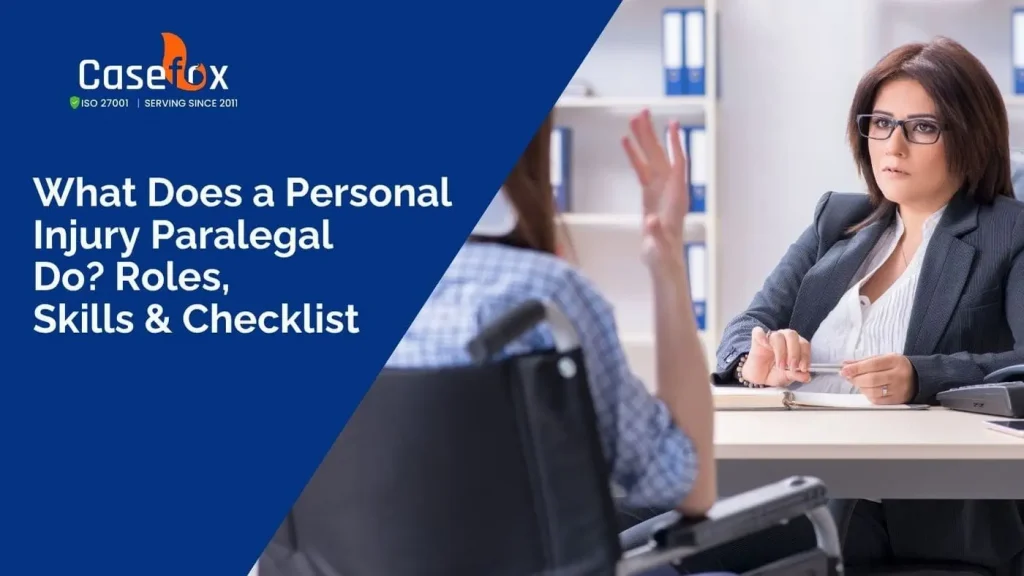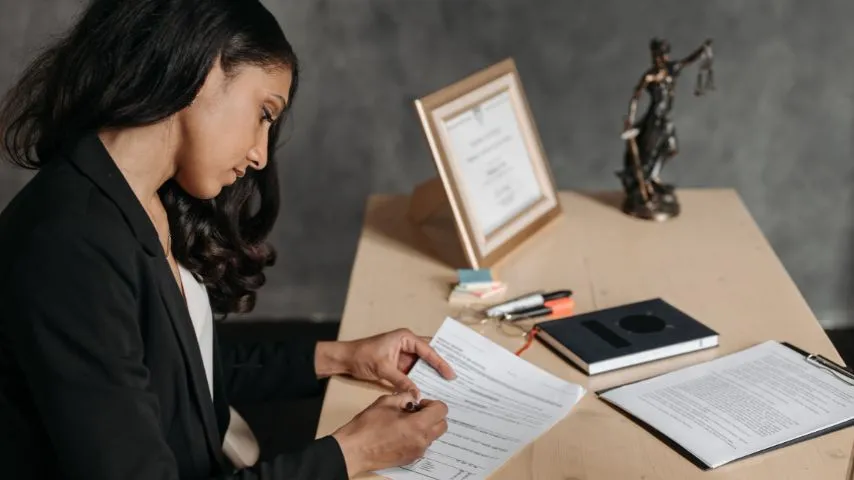What Does a Personal Injury Paralegal Do? Roles, Skills & Checklist

A paralegal works behind every personal injury claim, whether it be a car accident, slip and fall, or medical malpractice case, to make sure everything proceeds according to plan. They are the unseen force behind the scenes, ensuring that no detail is overlooked. Before a hearing or settlement, they go through the mountains of paperwork, deadlines, clients, and prepare attorneys.
Read on to learn what personal injury paralegals do daily, what they need to know to succeed, what their expected pay is, and a useful checklist to keep them on top of things.
What Is a Personal Injury Paralegal?
A personal injury paralegal is a lawyer who helps personal injury lawyers plan and manage injury-related cases. They handle everything from gathering medical records to drafting legal documents, organizing case activities, and communicating with clients.
Principal Duties:
- Compiling and arranging medical records
- Creating legal documents, including complaints, demand letters, and discovery responses
- Taking in and following up with clients
- Setting up court dates, medical examinations, and depositions
- Helping to prepare for the trial
- Regularly communicating with clients to give them updates and advice
To put it briefly, they keep the legal system functioning. Although they don’t represent clients or offer legal advice, they make every effort to help the client and the lawyer.

Importance in Law Firms and Litigation
Personal injury law is a busy, fast-paced field that includes a lot of paperwork. Without paralegals, lawyers would be overburdened with administrative tasks and unable to focus on strategy, negotiation, or trial.
The following factors make personal injury paralegals essential:
- They streamline workflow. Personal injury paralegals keep things going by ensuring that clients are informed, deadlines are met, and documents are accurate.
- They improve the experience of the client. Often, the first person a client sees, a personal injury paralegal, gives them a sense of support and being heard during a stressful time.
- They make lawyers more effective. Lawyers can devote more time to battling for the best outcome by handling the grunt work in
Personal Injury Paralegal Duties & Responsibilities
Personal injury paralegals play a key role in managing personal injury cases by organizing cases, keeping them on track, and moving them forward. While daily tasks may vary depending on the law firm or case type, several core responsibilities consistently appear in a personal injury paralegal’s job description:
Client Intake and Case File Management
Behind every smooth-running personal injury case, there’s usually a personal injury paralegal keeping everything (and everyone) on track. They’re often the quiet force making sure deadlines are met, clients aren’t left in the dark, and the attorney has what they need, exactly when they need it.
Of course, every law firm is a little different, and no two days are exactly alike, but there are a few key responsibilities you’ll find in just about any personal injury paralegal’s role. These tasks are the foundation of the case and the support system that holds it all together:

Drafting Legal Documents
Demand letters, complaints, motions, and settlement agreements are just a few of the many legal documents that paralegals draft. These are not your typical fill-in-the-blank forms.
Personal injury paralegals must comprehend how a case progresses and customize documents for every circumstance. Their writing needs to be persuasive and legally accurate, particularly when it comes to demand letters that initiate settlement talks.
Coordinating Medical Records and Evidence
The majority of personal injury cases are based on medical records. In addition to organizing medical bills and requesting and locating these records, personal injury paralegals occasionally collaborate with investigators or expert witnesses to obtain additional evidence, such as surveillance footage, accident reports, or photos. They are the ones who make the connection between injuries and legal responsibility.
Assisting with Discovery and Depositions
Personal injury paralegals assist in organizing interrogatories (written Q&As), preparing and responding to document requests, and coordinating depositions once both parties begin requesting information (also known as discovery).
Additionally, they ensure that deadlines are fulfilled because failing to do so can have a major negative impact on a case. In essence, they make sure that nobody is caught off guard in court.

Trial Preparation Support
As the trial approaches, tensions rise, and personal injury paralegals are at the center of it all. They help with fact-checking, exhibit preparation, witness logistics, and trial binders or presentations. Some even go to court with the attorney to help with the trial’s paperwork. Think of them as the invisible force that keeps things going when the stakes are high.
Essential Skills for a Personal Injury Paralegal
Being a personal injury paralegal isn’t just about knowing the law, it’s about staying organized, staying calm, and knowing how to communicate when people are going through one of the most difficult times in their lives.
Whether you’re helping build a case or simply updating a nervous client, the skills you bring to the table matter. A lot.
Here are some of the must-have skills that make a personal injury paralegal truly effective:

Legal Research and Writing
You don’t need to write like a lawyer, but you do need to think like one. Researching case law, drafting letters, reviewing reports- these are all daily tasks. And the more clearly and confidently you can put complex legal info into words, the more helpful you are to the attorney and the client.
Sharp Attention to Detail
Details can make or break a case. A wrong date, a misspelled name, a document filed late might seem small, but in the legal world, those small things can become big problems. Being the person who notices everything is one of the biggest assets you can bring to a legal team.
Clear and Compassionate Communication
Clients in personal injury cases are often scared, frustrated, or in pain. They’re not just looking for updates; they’re looking for someone who will listen, explain things clearly, and make them feel supported. Personal injury paralegals who can communicate with empathy and professionalism are often the ones clients remember most.

Understanding of Personal Injury Litigation
You don’t need to be a lawyer to understand how PI cases work, but having a working knowledge of how they progress (from legal intake to negotiation or trial) makes you incredibly valuable. It means you can stay a step ahead, prepare what’s needed before it’s asked for, and keep the case moving forward without unnecessary delays.
Conclusion
More than just a job, being a personal injury paralegal is an opportunity to contribute to something worthwhile. You’re doing more than just drafting documents and organizing files. You are assisting actual people who are experiencing actual hardships. You are a member of the group that provides them with direction, clarity, and assistance when they need it most.
If you’re someone who likes to stay organized, communicate clearly, and take pride in being dependable, this path might be a great fit. It’s not always easy; some days will feel long, and some cases will be tough, but it’s work that matters.